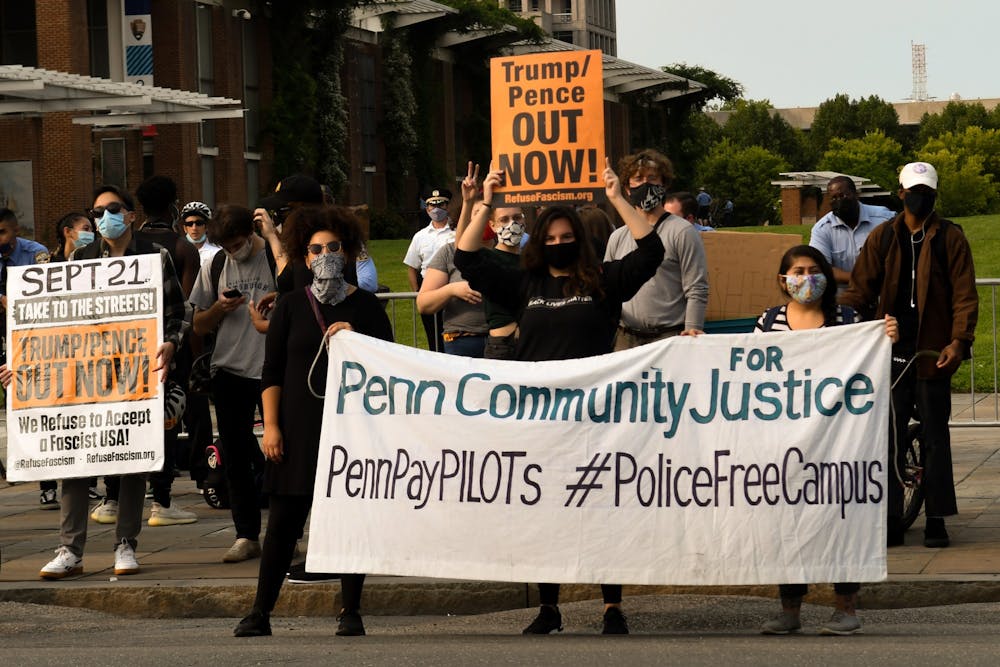
Members of Penn Community for Justice protested outside the National Constitution Center while President Donald Trump spoke inside for an ABC townhall.
Credit: Sukhmani Kaur2020 demanded a level of civic engagement not seen in recent times as a global pandemic, social justice movement, and contentious election season gripped the nation’s attention. Penn’s response was to name the 2020-2021 school year the Year of Civic Engagement, a very fitting theme for the Class of 2024’s reading project and various other academic initiatives throughout the school year. However, Penn as an institution has not taken civic-minded actions that reflect the theme they put forth or actions that demonstrate an understanding of the civic missions of their own community. As 2020 comes to a close, it is important to reflect on Penn’s failures to encourage and support students’, faculty’s, and staff’s civic engagement. In 2021, Penn’s student body must demand that the university do better.
Penn students, faculty, and staff are not shy when it comes to fighting for their beliefs and have been a force this year truly embodying civic engagement. Penn’s complicated history with Payments in Lieu of Taxes (PILOTs) gained massive attention after social justice movements shed light on structural racism in the nation. Penn’s refusal to pay PILOTs in light of the expected funding cuts in West Philadelphia schools seems to display complacency with the educational repercussions of coronavirus and structural racism. PILOTs have been and continue to be a consistent source of tension within the Penn and Philadelphia community since the university failed to renew a PILOT program in 2000 that ran from 1995 to 2000.

Some have taken to social media to once again stir up advocacy for PILOTs, using the Instagram account pennforpilots and garnering large support amongst students. A petition by faculty and staff garnered 1,127 signatures. Penn’s response to these outstanding efforts and worthy missions was underwhelming considering the civic engagement it claimed to be encouraging. Instead of paying PILOTs, Penn promised to pay $10 million a year for 10 years, a mere 10 percent of what it would owe in property taxes. The fight is not over. Penn’s behavior this year is the antithesis of what it preaches, but the Penn community must continue its civic-minded efforts to incite change in the university.
Penn’s “do as I say and not as I do” attitude was additionally exemplified by the school’s refusal to make any formal accommodations for students, faculty, and staff on election day. While every election day is vital, 2020’s presidential election demanded civic duty from everyone with the power to vote. The university, undoubtedly, recognized the significance of this election and in an email to the entire Penn community on Oct. 20 stated that “perhaps never before in our nation’s history has your vote been more important.” While Penn was unable to give the day off because of Pennsylvania’s minimum semester length requirement, it neglected to make any concrete effort to encourage voting, and failed to give paid time off to their 41,000 person staff. Two College seniors started a petition stating that the school’s mere encouragement did not suffice; paid time off was the only fair option, especially since some non-academic employees might not have been able to afford an unpaid day off from work. The petition has 13,088 signatures and counting. This fight did not end after election day, and efforts are still being made to encourage the school to change its policy moving forward. This is the spirit of civic engagement.
If this election year has taught people anything, it is that people and their activism have power even when they feel powerless. Joe Biden could not have won without various communities, who feel disenfranchised in this nation, exercising their right to vote. The votes of young people, the Black community, and the Latino community (in states like Arizona and Nevada, not Florida) proved to be decisive for Biden.

Their voices were heard on election day and taught the Penn community a lesson: the Penn community must demand that Penn as an institution cultivate a culture of civic engagement. Penn’s efforts in 2020 have been largely hypocritical. While the staff, faculty, and students have engaged in civic duty on their own, Penn remains civically disengaged.
Next semester, as the Year of Civic Engagement continues, Penn must do better by listening to its students’ demands. This means paying true PILOTs to Philadelphia, adjusting academic calendars to make election day a day off, and taking another look at divesting from fossil fuels. While Penn may fall short now, there is cause for hope. After students were frustrated at Penn for disregarding students’ well-being by slashing spring break, they created a petition. Penn Student Government pushed back by proposing their own solution, suggesting that the university instead adopt multiple single-day breaks in lieu of one continuous spring break. This engagement saw results after Penn canceled three days of classes for the next semester.
There is still so much more Penn can do to become a true progressive pillar, especially in the West Philadelphia community. While 2020 was a year of hypocrisy, with continued engagement by student, staff, and faculty, 2021 may have the potential to be Penn’s true year of civic engagement.
ISABELLA GLASSMAN is a College sophomore studying Philosophy, Politics, & Economics.
The Daily Pennsylvanian is an independent, student-run newspaper. Please consider making a donation to support the coverage that shapes the University. Your generosity ensures a future of strong journalism at Penn.
Donate



